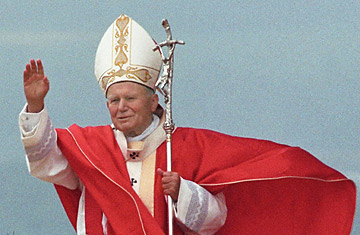
Pope John Paul II waves to a crowd in Gniezno, Poland, during a visit to his native country in 1997
(5 of 8)
There is a certain Panglossian spirit, sweet and fatuous, always at play in the margins of any discussion of forgiveness. Comedian Richard Pryor, in one of his routines, describes how he went to Arizona State Prison in order to make a 1980 movie called Stir Crazy. Before that experience, he said, he had recited a standard liberal line about the injustice of prisons. But after he met some of the homicidal brutes there and found out what crimes they had committed to earn their tuition, he said he was glad they had prisons with great big bars to hold people like that. In the real world, forgiveness sometimes makes sense as sentiment, but not as social policy.
That inconsistency can be resolved by assigning the two imperatives, justice and forgiveness, to different functional levels, to that of Caesar and that of God. Justice is a social question, while forgiveness introduces a transcendent element: love. Weighing the injunction in the Sermon on the Mount to turn the other cheek, Martin Luther concluded that an individual ought to obey the command, but a government should not. There are two orders, that of the law and that of the Gospel. One forgives in one's heart, in the sight of God, as the Pope did, but the criminal still serves his time in Caesar's jail. And yet if one assumes that the claims of God and Caesar are parallel lines, and do not connect with each other, then it is futile, or merely sentimental, to talk about how a spirit of forgiveness might come into poh" tics and international affairs. It is in the realm of Caesar that the bombing goes on.
In any case, experience teaches that forgiveness runs somewhat against human nature. The corollary of "To err is human, to forgive divine" is that to forgive is not human, not entirely so. To forget is human, and that eventual fading of a grievance from memory, not direct forgiveness, is quite often the solution.
It is interesting to wonder how, nearly a decade later, the American people see the Nixon case, whether that forgetting, almost a form of pseudo forgiveness, has occurred. Repentance is said to be a precondition for forgiveness, and Nixon has shown no sign that he has ever repented the deeds that forced him to resign. He toughed it out. Now he is a comparatively prosperous man, pursuing his career, writing books, doing serious work.
Consider what has become of some of Nixon's enemies, the people who, over the years, thought that they had left him for dead. John Kennedy, for example, buried 20 years ago, has undergone some savage revisionism that held him to be a second-rate President and an indiscreet philanderer. Pat Brown, who won the 1962 California gubernatorial race that supposedly ended Nixon's career ("You won't have Nixon to kick around any more . .. this is my last press conference") was superseded by an ideological antithesis, Ronald Reagan, and eventually by Brown's son Jerry, who is now in political limbo.
The process of forgetting as a substitute for forgiving may occur most readily in societies with a high rate of change, of physical and social mobility. That could explain why Americans do not on the whole bear enduring grudges, and sometimes find it difficult to understand the profound and centuries-long hatreds that can grip, say, the Middle East, the Balkans or Northern Ireland.
